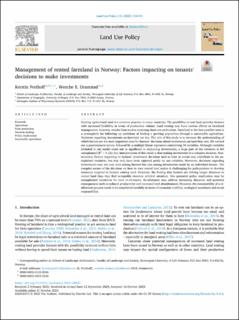| dc.contributor.author | Potthoff, Kerstin | |
| dc.contributor.author | Dramstad, Wenche | |
| dc.date.accessioned | 2024-03-11T10:28:17Z | |
| dc.date.available | 2024-03-11T10:28:17Z | |
| dc.date.created | 2023-11-13T14:32:26Z | |
| dc.date.issued | 2023 | |
| dc.identifier.citation | Land Use Policy. 2023, 135 . | |
| dc.identifier.issn | 0264-8377 | |
| dc.identifier.uri | https://hdl.handle.net/11250/3121772 | |
| dc.description.abstract | Renting agricultural land is a common practice in many countries. The possibility to rent land provides farmers with increased flexibility in terms of production volume. Land renting may have various effects on farmland management; however, results from studies analysing these are ambivalent. Farmland in the best possible state is a prerequisite for following up ambitions of feeding a growing population through a sustainable agriculture. Decisions regarding investments on farmland are key. The aim of this study is to increase the understanding of which factors are the most important ones for farmers’ decisions about investments on land they rent. We carried out a questionnaire survey followed by a multiple linear regression considering 34 variables. Although variables included in our model come out as significant in explaining investments, a large part of the variation is left unexplained (R2 = 0.22). Our interpretation of this result is that making investments is a complex decision. Non-economic factors impacting on farmers’ investment decisions such as trust or norms may contribute to the unexplained variation, but may only have been captured partly by our variables. Moreover, decisions regarding investments may not only vary among farmers but also among investments made by an individual farmer. The complex nature of the decisions on how to treat rented land makes it challenging for policymakers to develop measures targeted at farmers renting land. However, the finding that farmers are driving longer distances to rented land than they find acceptable deserves political attention. One potential policy implication may be strengthened incentives for land re-allotment. Re-allotment may address increasing distances and potential consequences such as reduced productivity and increased land abandonment. However, the sustainability of a re-allotment process needs to be considered carefully in terms of economic viability, ecological soundness and social responsibility. | |
| dc.description.abstract | Management of rented farmland in Norway: Factors impacting on tenants’ decisions to make investments | |
| dc.language.iso | eng | |
| dc.title | Management of rented farmland in Norway: Factors impacting on tenants’ decisions to make investments | |
| dc.title.alternative | Management of rented farmland in Norway: Factors impacting on tenants’ decisions to make investments | |
| dc.type | Peer reviewed | |
| dc.type | Journal article | |
| dc.description.version | publishedVersion | |
| dc.source.pagenumber | 9 | |
| dc.source.volume | 135 | |
| dc.source.journal | Land Use Policy | |
| dc.identifier.doi | 10.1016/j.landusepol.2023.106941 | |
| dc.identifier.cristin | 2195923 | |
| dc.relation.project | Norges forskningsråd: 194051 | |
| cristin.ispublished | true | |
| cristin.fulltext | original | |
| cristin.qualitycode | 2 | |
